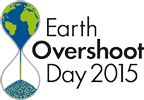 In less than eight months, humanity has used up nature’s budget for the entire year, according to data from Global Footprint Network.
In less than eight months, humanity has used up nature’s budget for the entire year, according to data from Global Footprint Network.
Global Footprint Network tracks humanity’s demand on the planet (Ecological Footprint) against nature’s ability to provide for this demand (biocapacity). Earth Overshoot Day marks the date when humanity’s annual demand on nature exceeds what Earth can regenerate in that year. Earth Overshoot Day has moved from early October in 2000 to August 13th this year.
The costs of this ecological overspending are becoming more evident by the day, in the form of deforestation, drought, fresh-water scarcity, soil erosion, biodiversity loss and the buildup of carbon dioxide in the atmosphere. The latter will significantly amplify the former, if current climate models are correct. Consequently, government decision-makers who factor these growing constraints in their policy making will stand a significantly better chance to set their nation’s long-term economic performance on a favourable track.
“Humanity’s carbon footprint alone more than doubled since the early 1970s, which is when the world went into ecological overshoot. It remains the fastest growing component of the widening gap between the Ecological Footprint and the planet’s biocapacity,” said Mathis Wackernagel, president of Global Footprint Network and the co-creator of the Ecological Footprint resource accounting metric. “The global agreement to phase out fossil fuels that is being discussed around the world ahead of the Climate Summit in Paris would significantly help curb the Ecological Footprint’s consistent growth and eventually shrink the Footprint.”
The climate agreement expected at the United Nations Conference of Parties (COP) 21 this December will focus on maintaining global warming within the 2-degrees-Celsius range over pre-Industrial Revolution levels. This shared goal will require nations to implement policies to completely phase out fossil fuels by 2070, per the recommendations of the U.N.’s International Panel on Climate Change (IPCC), directly impacting the Ecological Footprints of nations.
“We are encouraged by the recent developments on the front line of renewable energy, which have been accelerating worldwide, and by the increasing awareness of the finance industry that a low-carbon economy is the way of the future,” said Wackernagel. “Going forward, we cannot stress enough the vital importance of reducing the carbon footprint, as nations are slated to commit to in Paris. It is not just good for the world, but increasingly becoming an economic necessity for each nation. We all know that the climate depends on it, but that is not the full story: Sustainability requires that everyone live well, within the means of one planet. This can only be achieved by keeping our Ecological Footprint within our planet’s resource budget.”